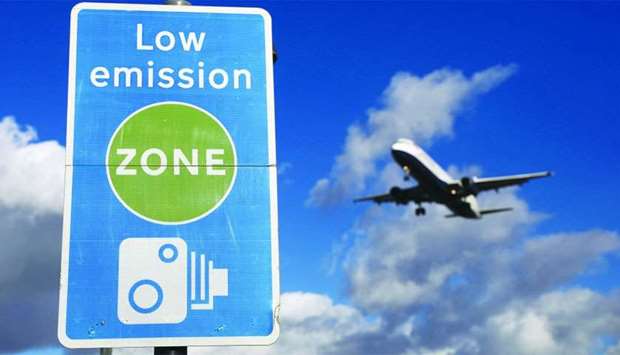The prospects for using lower-carbon biofuels in commercial aviation have brightened following a joint project to build what will be Europe's first large-scale plant to produce jet fuel from domestic and commercial waste.
Shell, British Airways and Velocys have recently applied for the planning permission for the plant from local authorities in North East Lincolnshire in the UK. They are targeting “domestic or commercial black bag waste” that would otherwise end up in landfills or incinerators.
The promoters target production of jet fuel from the North East Lincolnshire plant in five years, which means aeroplanes could be powered by jet fuel made from household rubbish from 2024.
Aviation accounts for around 2.5% of global carbon dioxide emissions but this is predicted to grow as air travel increases, at a time when nations are seeking to limit emissions to curb climate change.
The aviation industry has a target to cut its greenhouse gas emissions by 50% by 2050 compared with 2005 levels and sees the emergence of lower-carbon biofuels as a vital step to meeting this goal.
Consequently, the aviation industry has set out a four-pronged plan to achieve carbon-neutral growth from 2020 and halve net emissions from 2005 levels by 2050.
Waste-to-energy is already commonly used in the power sector, where household rubbish such as food or grass cuttings are burnt to create electricity, according to Reuters.
"Sustainable fuels can be a game changer for aviation, which will help power our aircraft for years to come," said British Airways chairman and chief executive officer Alex Cruz.
Reports suggest construction on the Altalto Immingham project, near the Humber Estuary in the northeast of England, could begin in 2021 with the site producing commercial volumes of sustainable aviation fuel (SAF) three years later. Altalto Immingham Ltd is a subsidiary of fuel technology firm Velocys.
A planning decision by the North East Lincolnshire Council is expected by November, a Reuters dispatch showed.
The three companies combined have invested a nearly $8.8mn in the project so far, which is ultimately expected to cost hundreds of millions of pounds to build.
The British government has also provided some funding for the project, which could create around 130 permanent and many more indirect jobs.
British Airways and Shell may also purchase the biofuel produced, which emits around 70% less greenhouse gases compared with the fossil fuel equivalent, Velocys said.
The global aviation industry says it is shrinking its carbon footprint and its sustainability plan is among the “most ambitious and globally focused” of any industry.
Use of sustainable fuel or lower-carbon biofuels would have the single largest impact, reducing emissions from each flight by around 80%, according to the International Air Transport Association (IATA) – the global trade body of airlines. The problem, however, is that it is in short supply.
IATA targets 2% of total fuel supply from sustainable sources by 2025 and then expects a steady increase.
The global Carbon Offsetting and Reduction Scheme for International Aviation (CORSIA) launched by IATA allows airlines to purchase pollution credits from environmental projects. CORSIA addresses the increase in total CO2 emissions from international aviation above 2020 levels.
IATA says CORSIA’s obligations have already started. As of January 1 this year, all carriers are required to report their CO2 emissions on an annual basis.
“The aviation industry is committed to technology, operational and infrastructure advances to continue to reduce the sector's carbon emissions. Offsetting is not intended to replace these efforts. Nor would the CORSIA make fuel efficiency any less of a day-to-day priority,” IATA noted.
It is forecast that CORSIA will mitigate around 2.5bn tonnes of CO2 and generate over $40bn in climate finance between 2021 and 2035.
Sustainable Aviation Fuels are being produced and used in commercial flights every day. Current volumes produced are low (less than 1% of total jet fuel demand); however, these volumes can be substantially increased with co-ordinated support including effective policy frameworks, IATA says.
At the 73rd IATA AGM in Cancun in 2017, members of the trade body unanimously endorsed a resolution on the deployment of SAF. IATA believes that if all options to increase SAF production are explored, up to 1bn passengers can have flown on a SAF-blend flight by 2025 and with appropriate policy support; penetration should be approaching 2% or a nearly 7bn litres.
Proponents of sustainable aviation fuels argue that time is right for aviation biofuels to take off, given the fact that the global aviation industry produces around 2% of all human-induced carbon dioxide emissions.
Sceptics, however, say biofuels are still expensive and hence not currently viable for commercial aviation.
A report in Green Biz said, “Our climate cannot afford to wait another several decades for solutions to aviation’s emissions problem. The global aviation industry produces around 2% of all human-induced carbon dioxide emissions. Options for reducing flight CO2 are limited, and the IATA expects 7.2bn air travellers in 2035, close to double the 3.8bn air travellers in 2016.
“Because of these factors, air travel’s proportion of total global emissions will grow. With a potential for an 80% reduction in life-cycle emissions, sustainable aviation fuels represent the best bet for decarbonisation. To paint a clearer picture, if in 2020, 5% of commercial aviation’s fuel supply consisted of sustainable fuels, its overall carbon footprint could drop by 4%. That’s consequential.”
But, an industry analyst said, “Biofuels are an expensive niche product as of now, so airlines can’t afford to buy large quantities. So producers are seen as high risk in the short-term market, and therefore there’s no investment in the larger production factories needed to bring the cost down.”
*Pratap John is Business Editor at Gulf Times.


